from Apr. 20, 1865
Mayor's Proclamation on the Death of Abraham Lincoln - Brownville, Nebraska
-
Full Title
Brownville, Nebraska Territory Mayor's Proclamation on the Death of Abraham Lincoln
-
Description
The newly elected Mayor of Brownville, Nebraska Territory, Charles G. Dorsey, made a proclamation on the death of Abraham Lincoln, which was published in the Nebraska Advertiser the week after the President's death. The town of Brownville heard about Lincoln's death almost immediately. The city of Brownville was only about 10 years old at the time of Lincoln's assassination. The Nebraska Advertiser was founded in 1856 by a recent resident, Robert Wilkinson Furnas. Fumas was opposed to slavery and those views were often illustrated in the newspaper.
-
Source
-
Rights
This item is in the public domain and may be reproduced and used for any purpose, including research, teaching, private study, publication, broadcast or commercial use, with proper citation and attribution.
-
Tags
-
Cite this Item
Nebraska Advertiser. "Brownville, Nebraska Territory Mayor's Proclamation on the Death of Abraham Lincoln". Robert Wilkinson Furnas. Remembering Lincoln. Web. Accessed June 23, 2025. https://rememberinglincoln.fords.org/node/1097
-
Creator
Nebraska Advertiser
-
Publisher
Robert Wilkinson Furnas
-
Date
April 20, 1865
from Apr. 20, 1865
Brownville, Nebraska Territory Mayor's Proclamation on the Death of Abraham Lincoln

-
Description
The newly elected Mayor of Brownville, Nebraska Territory, Charles G. Dorsey, made a proclamation on the death of Abraham Lincoln, which was published in the Nebraska Advertiser the week after the President's death. The town of Brownville heard about Lincoln's death almost immediately. The city of Brownville was only about 10 years old at the time of Lincoln's assassination. The Nebraska Advertiser was founded in 1856 by a recent resident, Robert Wilkinson Furnas. Fumas was opposed to slavery and those views were often illustrated in the newspaper.
-
Source
-
Rights
This item is in the public domain and may be reproduced and used for any purpose, including research, teaching, private study, publication, broadcast or commercial use, with proper citation and attribution.
-
Creator
Nebraska Advertiser
-
Publisher
Robert Wilkinson Furnas
-
Date
April 20, 1865
from Apr. 15, 1865
A Proclamation by Rhode Island Governor
-
Full Title
A Proclamation by James Youngs Smith, Governor of the State of Rhode Island
-
Description
James Youngs Smith, the 29th Governor of Rhode Island, issued a proclamation on the day of Abraham Lincoln's assassination asking the clergy of Rhode Island to commemorate the President and pray for the country during the upcoming Sunday services. Born in Groton, Connecticut in 1809, Smith moved to Providence, Rhode Island at the age of 16 to work for a lumber business. Later in life he bought mills in both Connecticut and Rhode Island. He served three terms as Governor of Rhode Island as a Republican before declining to run for a fourth term. He served throughout the Civil War and was able to fill the state's troop quota through voluntary enlistment because the citizens of Rhode Island opposed drafting soldiers. Smith married Emily Brown, the daughter of a cotton manufacturer from Massachusetts and had three children.
-
Source
Library of Congress, Rare Book And Special Collections Division
-
Rights
Transmission or reproduction of protected items beyond that allowed by fair use requires the written permission of the copyright owners.
-
Tags
-
Cite this Item
James Y. Smith. "A Proclamation by James Youngs Smith, Governor of the State of Rhode Island". Rhode Island, Governor. Remembering Lincoln. Web. Accessed June 23, 2025. https://rememberinglincoln.fords.org/node/1093
-
Creator
James Y. Smith
-
Publisher
Rhode Island, Governor
-
Date
April 15, 1865
-
Material
Printed on page [1] of a single-folded sheet.
-
Dimensions
21 cm.
from Apr. 15, 1865
A Proclamation by James Youngs Smith, Governor of the State of Rhode Island
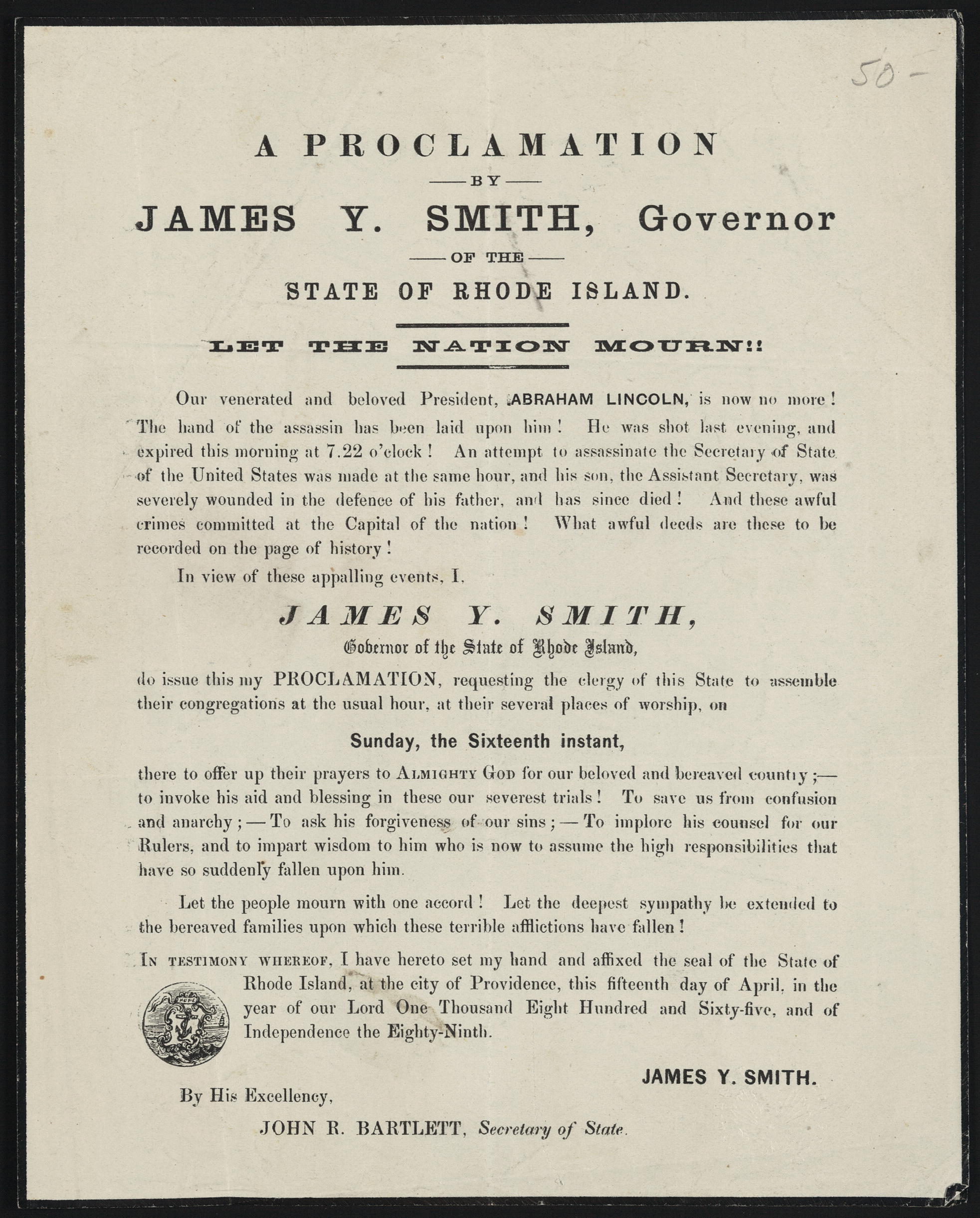
-
Description
James Youngs Smith, the 29th Governor of Rhode Island, issued a proclamation on the day of Abraham Lincoln's assassination asking the clergy of Rhode Island to commemorate the President and pray for the country during the upcoming Sunday services. Born in Groton, Connecticut in 1809, Smith moved to Providence, Rhode Island at the age of 16 to work for a lumber business. Later in life he bought mills in both Connecticut and Rhode Island. He served three terms as Governor of Rhode Island as a Republican before declining to run for a fourth term. He served throughout the Civil War and was able to fill the state's troop quota through voluntary enlistment because the citizens of Rhode Island opposed drafting soldiers. Smith married Emily Brown, the daughter of a cotton manufacturer from Massachusetts and had three children.
-
Source
Library of Congress, Rare Book And Special Collections Division
-
Rights
Transmission or reproduction of protected items beyond that allowed by fair use requires the written permission of the copyright owners.
-
Creator
James Y. Smith
-
Publisher
Rhode Island, Governor
-
Date
April 15, 1865
-
Material
Printed on page [1] of a single-folded sheet.
-
Dimensions
21 cm.
from Apr. 28, 1865
Lincoln Assassination, April 28th, 1865
-
Full Title
El Nuevo Mundo: Lincoln Assassination, April 28th, 1865
-
Description
El Nuevo Mundo [The New World], was a Spanish tri-weekly newspaper dedicated to the interest of Republicanism in the Americas; copies were circulated throughout California, Mexico, Central America, and South America. In this issue, the newspaper included an illustration and an account from an eyewitness of the assassination of Lincoln in the Ford Theatre. Taking place two weeks after the assassination, El Nuevo Mundo reporters attended a Mexican Patriotic Club meeting in Virginia, Nevada. The President of the club gave a speech, expressing a thirst for justice and the fall of the Confederacy. The Society of Patriotic Women of Virginia City was also in attendance at the meeting in junction with the men of the Mexican Patriotic Club, whose president also gave a speech in front of the entire body. In a slightly altered manner, she spoke of not merely a hopeful defeat of the Confederates, but of return to union.
-
Transcription
“The Lady Harris, who was in the box with the president, gives the following account: The assassin entered in the box, and Major Rathburn [Henry Rathbone] got up and asked the intruder what business had him there. Without answering he ran inside, and placed the gun to the head of the president, fired, and in that instant he jumped onto the balustrade of the box and made a threatening motion with a dagger he carried, pointed at the face or chest of Mr. Lincoln… Major Rathburn [Rathbone] jumped forward to protect the president, grabbed the assassin by the end of his frock and was stabbed in the arm. The assassin then jumped onto the stage and fled – Dispatch of the associated press”
-
Source
Newsbank
-
Rights
Use of this item for research, teaching, and private study is permitted with proper citation and attribution. Reproduction of this item for publication, broadcast, or commercial use requires written permission.
-
Tags
-
Cite this Item
El Nuevo Mundo. "El Nuevo Mundo: Lincoln Assassination, April 28th, 1865 ". El Nuevo Mundo. Remembering Lincoln. Web. Accessed June 23, 2025. https://rememberinglincoln.fords.org/node/1090
from Apr. 28, 1865
El Nuevo Mundo: Lincoln Assassination, April 28th, 1865
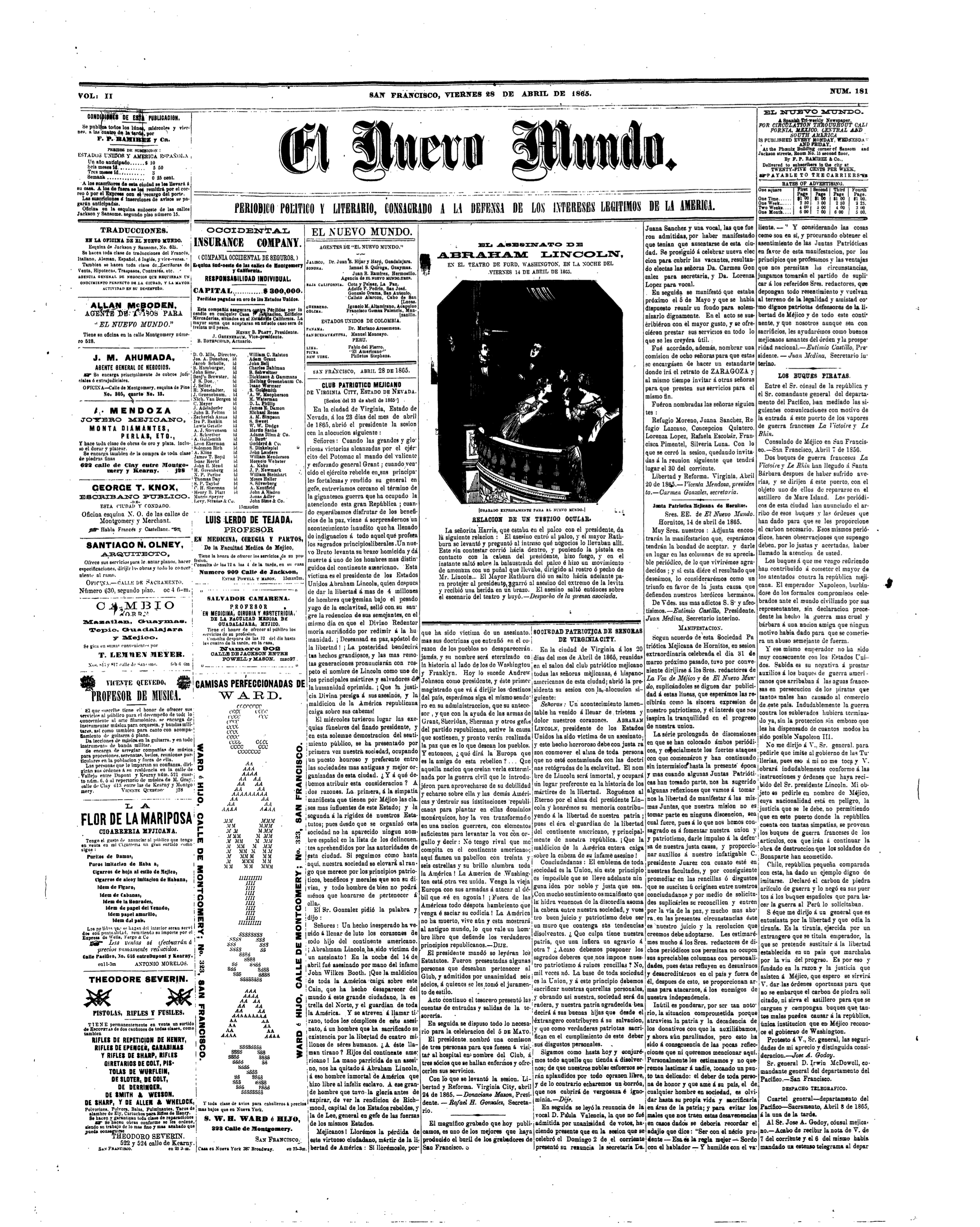
-
Description
El Nuevo Mundo [The New World], was a Spanish tri-weekly newspaper dedicated to the interest of Republicanism in the Americas; copies were circulated throughout California, Mexico, Central America, and South America. In this issue, the newspaper included an illustration and an account from an eyewitness of the assassination of Lincoln in the Ford Theatre. Taking place two weeks after the assassination, El Nuevo Mundo reporters attended a Mexican Patriotic Club meeting in Virginia, Nevada. The President of the club gave a speech, expressing a thirst for justice and the fall of the Confederacy. The Society of Patriotic Women of Virginia City was also in attendance at the meeting in junction with the men of the Mexican Patriotic Club, whose president also gave a speech in front of the entire body. In a slightly altered manner, she spoke of not merely a hopeful defeat of the Confederates, but of return to union.
-
Source
Newsbank
-
Rights
Use of this item for research, teaching, and private study is permitted with proper citation and attribution. Reproduction of this item for publication, broadcast, or commercial use requires written permission.
-
Creator
El Nuevo Mundo
-
Publisher
El Nuevo Mundo
-
Date
April 28, 1865
-
Material
newspaper
from May. 1, 1865
La Crosse Reactions
-
Full Title
La Crosse Reactions
-
Description
With the news of President Lincoln's death, the people of La Crosse, Wisconsin, reacted in a similar manner as thousands throughout the country did. Business were closed, and the rest of the buildings of this Mississippi River town were in mourning.The article addresses that although Secretary of State William Seward was attacked he was not in fact killed, although it speculates that his attendant was. Further down, under "Solemn Services," the newspaper informs its readers that a prayer service will be held in one of the town's churches. Although Ford's Theatre is over a thousand miles from this town, the vast majority of the citizens of La Crosse took the news almost personally, and mourned accordingly.
-
Rights
This item is in the public domain and may be reproduced and used for any purpose, including research, teaching, private study, publication, broadcast or commercial use, with proper citation and attribution.
-
Tags
-
Cite this Item
La Crosse Daily Republican . "La Crosse Reactions". Remembering Lincoln. Web. Accessed June 23, 2025. https://rememberinglincoln.fords.org/node/919
from May. 1, 1865
La Crosse Reactions
-
Description
With the news of President Lincoln's death, the people of La Crosse, Wisconsin, reacted in a similar manner as thousands throughout the country did. Business were closed, and the rest of the buildings of this Mississippi River town were in mourning.The article addresses that although Secretary of State William Seward was attacked he was not in fact killed, although it speculates that his attendant was. Further down, under "Solemn Services," the newspaper informs its readers that a prayer service will be held in one of the town's churches. Although Ford's Theatre is over a thousand miles from this town, the vast majority of the citizens of La Crosse took the news almost personally, and mourned accordingly.
-
Rights
This item is in the public domain and may be reproduced and used for any purpose, including research, teaching, private study, publication, broadcast or commercial use, with proper citation and attribution.
-
Creator
La Crosse Daily Republican
-
Date
May 1, 1865
from Apr. 15, 1865
Tanner Manuscript
-
Full Title
The James Tanner Manuscript
-
Description
In 1865 Corporal James Tanner was a disabled Civil War veteran working as a clerk in the Ordnance Bureau of the War Department and living in an apartment next to the Petersen House in Washington, D.C. On April 14th, President Abraham Lincoln was shot during a theatre performance at Ford’s Theatre. The mortally wounded President was taken to the Petersen House. Because he had stenography skills, Tanner was called into the Petersen House. While Lincoln lay dying in the bedroom, Tanner sat in the parlor and recorded eyewitness testimony as given to Secretary of War Edwin Stanton and David Kellogg Cartter, Chief Justice of the Supreme Court of the District of Columbia. The interrogation of the witnesses took place between midnight and 1:30 A.M. "In fifteen minutes I had testimony enough to hang Wilkes Booth, the assassin, higher than ever Haman hung" noted Tanner. While still in the parlor, Tanner transcribed his shorthand notes into longhand, finishing his task at 6:45 A.M. Tanner returned to his apartment and, dissatisfied with the quality of the first transcription, began a second copy which he left with an aide of Stanton's at his office in the War Department. Tanner retained the original testimony. The copy deposited at the War Department was lost. In 1905, Tanner’s son took his father’s first transcription and mounted each sheet on linen and bound them. In November 1917, as the Union League prepared to celebrate its 55th anniversary and dedicate the Lincoln Memorial Room, Corporal James Tanner wrote to UL President John Gribbell to offer his bound volume of testimony to the League’s collection: "believing that they are of considerable interest to the general public owing to the circumstances surrounding their creation and believing they will become more so as the years pass, I write to say that if you care to give the volume a place among the treasures you may now possess or may naturally gather in the future regarding President Lincoln, I shall be glad to present them to you in perpetuity, limited only to the life of the Union League." Digitization courtesy of the Schoenberg Center for Electronic Text and Image, University of Pennsylvania Libraries.
-
Transcription
Scroll down to "Related Resources" for a downloadable transcription with page breaks that match the original manuscript.
-
Source
The Abraham Lincoln Foundation of The Union League of Philadelphia (Object ID: XI.2.1917.2)
-
Rights
Use of this item for research, teaching and private study is permitted with proper citation and attribution, as “Courtesy of The Abraham Lincoln Foundation of The Union League of Philadelphia.” Reproduction of this item for publication, broadcast or commercial use requires written permission. For permission, please contact The Abraham Lincoln Foundation.
-
Tags
-
Cite this Item
James Tanner. "The James Tanner Manuscript". Remembering Lincoln. Web. Accessed June 23, 2025. https://rememberinglincoln.fords.org/node/892
from Apr. 15, 1865
The James Tanner Manuscript
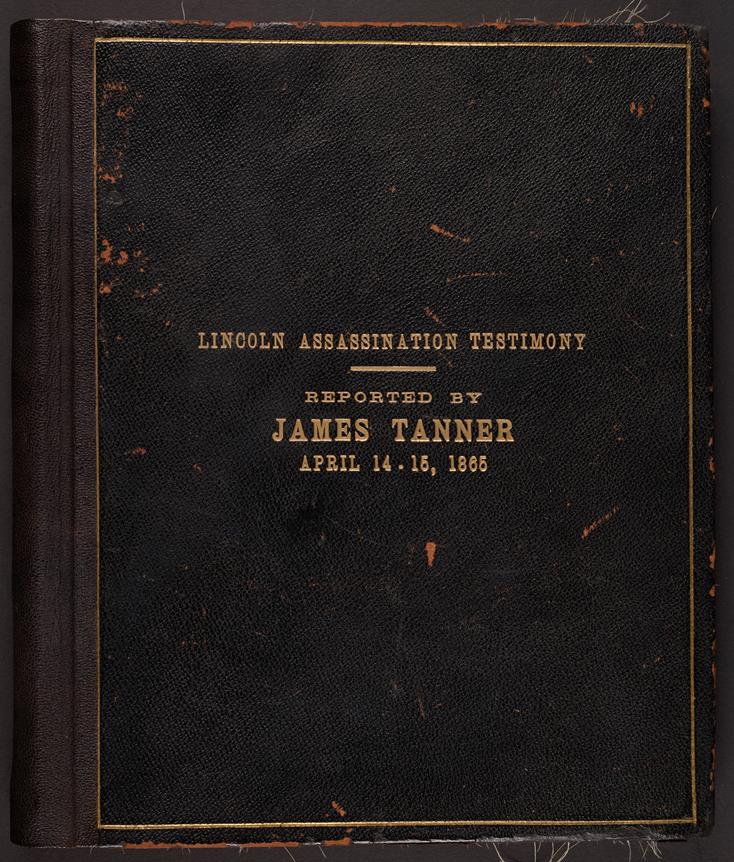
-
Description
In 1865 Corporal James Tanner was a disabled Civil War veteran working as a clerk in the Ordnance Bureau of the War Department and living in an apartment next to the Petersen House in Washington, D.C. On April 14th, President Abraham Lincoln was shot during a theatre performance at Ford’s Theatre. The mortally wounded President was taken to the Petersen House. Because he had stenography skills, Tanner was called into the Petersen House. While Lincoln lay dying in the bedroom, Tanner sat in the parlor and recorded eyewitness testimony as given to Secretary of War Edwin Stanton and David Kellogg Cartter, Chief Justice of the Supreme Court of the District of Columbia. The interrogation of the witnesses took place between midnight and 1:30 A.M. "In fifteen minutes I had testimony enough to hang Wilkes Booth, the assassin, higher than ever Haman hung" noted Tanner. While still in the parlor, Tanner transcribed his shorthand notes into longhand, finishing his task at 6:45 A.M. Tanner returned to his apartment and, dissatisfied with the quality of the first transcription, began a second copy which he left with an aide of Stanton's at his office in the War Department. Tanner retained the original testimony. The copy deposited at the War Department was lost. In 1905, Tanner’s son took his father’s first transcription and mounted each sheet on linen and bound them. In November 1917, as the Union League prepared to celebrate its 55th anniversary and dedicate the Lincoln Memorial Room, Corporal James Tanner wrote to UL President John Gribbell to offer his bound volume of testimony to the League’s collection: "believing that they are of considerable interest to the general public owing to the circumstances surrounding their creation and believing they will become more so as the years pass, I write to say that if you care to give the volume a place among the treasures you may now possess or may naturally gather in the future regarding President Lincoln, I shall be glad to present them to you in perpetuity, limited only to the life of the Union League." Digitization courtesy of the Schoenberg Center for Electronic Text and Image, University of Pennsylvania Libraries.
-
Source
The Abraham Lincoln Foundation of The Union League of Philadelphia (Object ID: XI.2.1917.2)
-
Rights
Use of this item for research, teaching and private study is permitted with proper citation and attribution, as “Courtesy of The Abraham Lincoln Foundation of The Union League of Philadelphia.” Reproduction of this item for publication, broadcast or commercial use requires written permission. For permission, please contact The Abraham Lincoln Foundation.
-
Creator
James Tanner
-
Date
April 15, 1865
-
Material
Paper, board, cloth
-
Dimensions
11" H x 9.5" W
from Jan. 1, 1889
Scrapbook of Charles B. Andrus
-
Full Title
Scrapbook of Charles B. Andrus
-
Description
Excerpt of news-clippings from the scrapbook of Charles B. Andrus (1848-1937); member and commander of quasi-military organization Putnam phalanx in Hartford, CT. Contains descriptions of Abraham Lincoln's assassination along with juxtaposition of Lincoln and James Garfield's assassins. News-clippings attempt to draw conclusions about the motivations of the assassins based-upon a comparison of physical and emotional traits of each assassin.
-
Source
Ms 86281
-
Rights
Use of this item for research, teaching and private study is permitted with proper citation and attribution to the Connecticut Historical Society. Reproduction of this item for publication, broadcast or commercial use requires permission. For permission, please contact the Connecticut Historical Society. chs.org/research/digital-reproductions.
-
Tags
-
Cite this Item
Charles Andrus. "Scrapbook of Charles B. Andrus ". Daniel Slote & Co, New York (scrapbook). Remembering Lincoln. Web. Accessed June 23, 2025. https://rememberinglincoln.fords.org/node/865
from Jan. 1, 1889
Scrapbook of Charles B. Andrus

-
Description
Excerpt of news-clippings from the scrapbook of Charles B. Andrus (1848-1937); member and commander of quasi-military organization Putnam phalanx in Hartford, CT. Contains descriptions of Abraham Lincoln's assassination along with juxtaposition of Lincoln and James Garfield's assassins. News-clippings attempt to draw conclusions about the motivations of the assassins based-upon a comparison of physical and emotional traits of each assassin.
-
Source
Ms 86281
-
Rights
Use of this item for research, teaching and private study is permitted with proper citation and attribution to the Connecticut Historical Society. Reproduction of this item for publication, broadcast or commercial use requires permission. For permission, please contact the Connecticut Historical Society. chs.org/research/digital-reproductions.
-
Creator
Charles Andrus
-
Publisher
Daniel Slote & Co, New York (scrapbook)
-
Date
January 1, 1889
-
Material
bound book containing newsprint clippings
-
Dimensions
28.5cm x 21cm
from Sep. 9, 2015
"Great Sorrow" & "Ford's Theater"
-
Full Title
Grand Rapids Herald Articles
-
Description
In a retrospective, the Grand Rapids Herald sought the perspectives of local residents who remembered the day Lincoln was assassinated. Harvey J. Hollister recalled the intense grief felt by many in Grand Rapids and the ways in which they practiced collective, public mourning. Next, the article quoted extensively from two editorials by the Grand Rapids Eagle, one on the day the war ended on April 8, 1865, and one immediately after the assassination on the 15th. These were included to be representative of the broader shift in Northern public opinion from optimism to disillusionment in this short span of time. In the subsequent article, Big Rapids, Michigan, resident J. P. Huling described his memories of being an audience member at Ford’s Theater the night of the assassination. Furthermore, he remembered details of Lincoln’s funeral as well as the two times he saw Lincoln before the president’s death.
-
Transcription
[penciled in at top of page] [1899] The Grand Rapids H[cut off]
Was a Day of Great Sorrow
----------
The Assassination of
President Lincoln
Thirty-Four Years
Ago Still Fresh in
the Mind of the
People—How the
News of the Trag-
edy Was Received
in Grand Rapids,
April 15, 1865.
It was just 34 years ago yesterday that
the sad news swept over the country that
“Honest Old Abe,” the martyr president,
had died by the assassin’s knife. Doubly
sad was it because of the frame of mind
in which it found the people. The tidings
of the surrender of Lee’s entire army and
the probably downfall of the confederacy
had but the week before thrown the cou-
try into an ecstacy of joy, and the cele-
brations of that glad news were still go-
ing on and on the faces of all the smile of
great joy reflected the feeling of every
heart. Then like the bolt from the clear
sky fell the news that Lincoln had after
years of toil in behalf of his loved coun-
try at last made the supreme sacrifice
and had crossed the river to enter into
the welcome that surely awaited him on
the other side.
To those who were living at that time
the recollection of that dark 15th of April
is still as fresh as if the happening had
been but yesterday.
Harvey J. Hollister was at the time liv-
ing in the city and recalls most vividly
the scenes of what he terms the saddest
and strangest day he ever spent.
Said Mr. Hollister in describing how
the news was received here: “My wife
and I were walking down to the bank to-
gether about 9 o’clock in the morning
and the first thing which attracted our
attention was the strange actions of the
people on the street. On the face of
every one we met we notice a look of
the most abject sorrow. So remarkable
was it that we became most anxious to
know the reason. It was but a week be-
fore that we had helped to celebrate
when the news of Lee’s surrender reach-
ed us, and we thought that the war was
over and now the people looked more
somber than after the greatest defeats
[illustration of Ford’s Theater]
[Caption] [FORD’S THEATER, WASHINGTON]
which we had suffered. Men would stop
and look into each other’s faces and then
as they shook hands, tears would begin
to roll down their cheeks and they would
separate without a word.
“At last we reached the telegraph of-
fice and found it crowded with a lot of
silent men. Leaving my wife outside, I
crowded in and soon learned the sad
news. It is impossible to describe the
utter feeling of bewilderment which pos-
sessed us all. I felt as if the very
ground had been cut from under me. We
had by that time come to know and ap-
preciate the magnificent qualities and in-
finite wisdom of the president and each
man that morning wept as though he had
lost a dear friend or some member of his
own household.
“The grief at that time was different
from that which I ever saw before or
since in its personal character. The com-
on people had come to have implicit
confidence and trust in the wisdom of
the president and when the news reached
us that he was gone it was as though
we had suddenly been told that our last
and only hope had failed.
---------
“Business was stopped at once and all
places were closed and the mayor issued
a proclamation that all flags be hung at
half mast and that all business cease for
the day. The people crowded into the
streets and meetings were held which
were all pervaded by the same spirit of
absolute grief which was reflected in the
face of every passerby. Monroe street
was one mass of black from head to foot
and the residence portion of the city was
all draped: everything of a black color
being utilized to express in this only
available way the intense sorrow which
was in every one’s heart. The next day
which was Sunday, the services in every
church were of a memorial character
and Lincoln’s greatness was eulogized by
men who struggled with their emotions
and who utterly failed to find the words to
express the sorrow they felt. At first it
was thought that the work was that of
emissaries of the confederacy and the
wrath of the people found vent in the im-
precations against a power that would
avail its unholy purposes.
“I recall exactly the words which one
man said when he turned from the office
after hearing the news. They were:
‘Well, the south has lost the best friend
she ever had,’ and as he spoke the tears
ran down his cheeks in torrents.”
---------
Two editorials clipped from the Grand
Rapids Eagle of the issues of April 8 and
9 show the strong revulsion of feeling
which passed over the populace at the
time when the news of the death of the
president reached here. On April 8 the
editor wrote of Lee’s surrender thus:
[written in smaller font] [The end has come. The morning is so far
advanced that the sun of peace shows his edge
above the horizon, presaging a cloudless day—
a day that shall not go down again until time
shall be no more—a day that shall glow with
universal freedom and blossom with progress.
Last night the nation lay down divided, dis-
tracted, bleeding—a giant in battle-harness
matched against his brother. This morning we
wake, still in battle-harness, the greatest.
grandest, freest, most powerful nation on earth.
Today our kindly, generous, wise, great-hearted
president, Abraham Lincoln (whom nations at-
tempted to sneer down but yesterday), stands
the central figure of the nineteenth century.
“Honest Old Abe” stands at least one hundred
feet taller than any other ruler in Christen-
dom today.
There is but one fleet in all of the world
whose flag had been floated and been tried in
actual battle; and Vice Admiral Farragut
waits the order of President Lincoln wither to
direct its thunders.
There is but one army of veterans in the
world—privates and generals—and Lieutenant
General Grant directs that, with Sherman and
Sheridan, Thomas and Meade as his lieuten-
ants, and with Robert E. Lee and his host as
their captives.
And over this ruin and this triumph, this fall
and this glory, brothers strike hands again,
and the states unite in the old but grander fam-
ily circle as one nation, under one flag, with
one president. And freedom seals the compact
for all. The Declaration of Independence be-
longs now to all the states, and the souls of
the martyrs of liberty are marching on with
John Brown’s.
Let the bells ring, then, and the cannon
thunder. Let all our citizens join in the dem-
onstration of joy. Let us hold one grand, uni-
versal, enthusiastic joy meeting this evening at
some suitable place, either within or without
doors, and congratulate each other. Let every
building in the city blaze with light this even-
ing.]
How different sounds the words of the
same writer in the next issue, on the
15th:
[written in smaller font] [“Vale!” “Vale!”
The wine of life is spilled; the royal cup of
fine gold is broken. Domestic faction, with
horrible instruction, has taught the nation the
utter malignity of secession. Treason has done
its worst, and on our noblest. The bloody dag-
ger’s point has reached the nation’s soul, with
poison in its wound, to carry grief, horror and
consternation through our veins; and as the
numbness of the shock wears off, and the heal-
ing begins, it will wake a fever of fury whose
end and effect none can foretell.
The times are dark again. Sudden and dis-
astrous eclipse has rushed upon the morning
of peace and returning fraternity, but a mo-
ment since without a cloud upon its glory, or
a chill in its breath of balm.
All is again uncertainty; state policy and
chance, government and faction, law and an-
archy, freedom and slavery, battle and truce,
revenge and mercy, order and chaos, jostle each
other in the dark, and no man can see whther
the majestic ship of state (whose cable has
been cut in the night by the assassin’s knife,)
is drifting; whether out of this event shall
come evil or good to the nation and the world;
whether we shall again moor in the haven of
peace and union, or have but opened the har-
bor to be mocked with out last glimpse of na-
tional brotherhood.
The president is dead—the greatest, purest,
kindest soul Heaven and man ever conspired
to crowd with public honors—the surest, saf-
est, truest friend, leader and reflex of the peo-
ple. Great beyond his times, he was at once
the greatest, grandest hero of history and the
kindest and commonest of the crowd of men.
his last act was a benediction. Rather than
disappoint the populace who expected his pres-
ence at the theater, he went to his death,
though both he and his wife were ill; thus fall-
ing a sacrifice in this little, this homely, this
common and natural act, which his death has
[illustration of John Wilkes Booth]
[Caption] [J. WILKES BOOTH]
guilded with immortality. He was of the peo-
ple; he died in a sense for the common peo-
ple. He was the pattern of the common peo-
ple and the ripe fruit of American democracy;
at the same time the unchallenged peer of his-
tory, and the certain master of living great-
ness. Heaven’s evident and commissioned in-
strument he was crowned with success and
with immortality in the same week.
Secretary Seward dies with his master and
his friend. So two great souls—the greatest, in
all, that the world held in all its bounds—step
into glory abreast, both crowned with all that
makes life honorable, and both clothed with
that raiment that makes death glorious. Such
a pair, so matched and sustained in all good
graces, so loved and mourned, have never in
one hour knocked at the pearly gate nor met
such glorious welcomed within.]
Such was the spirit of the people ad-
mirably reflected in the columns of the
paper of the day which was heralded abroad
that the assassin had been run down and
shot the people only regretted that he
met with such an easy fate.
WAS PRESENT AT FORD’S THEATER.
---------------------
Big Rapids Merchant Talks of the National Horror
Enacted 34 Years Ago at Washington.
[written in smaller font] [Special to Grand Rapids Herald.]
Big Rapids, Mich., April 15.—J. P. Hul-
ing, one of our leading merchants, was
present at Ford’s theater, in Washington,
the evening that has since gone into his-
tory as marking one of the greatest trag-
edies of modern times. President Lincoln
was assassinated by J. Wilkes Booth,
April 14, 1865, 34 years ago today, and
Mr. Huling, in response to a request, told
his personal experience substantially as
follows:
“I served during the rebellion in Com-
pany C, Seventeenth United States in-
fantry, and after receiving my discharge,
I visited the city of Washington on bus-
iness, arriving there April 14, and that
evening, by invitation of James T. Hale,
the representative in congress from my
district, the Eighteenth Pennsylvania,
accompanied him to Ford’s theater, where
we expected to pass a pleasant hour or
two. As we strolled down to the theater,
we little thought that in a short time the
whole nation would be bowed in grief at
a tragedy which was to be enacted in
our presence. We passed to our seats and
soon the curtain rose and the play pro-
ceded. After Booth had committed his
shocking crime and leaped from the booth
to the stage, my friend and myself, who
were both familiar with the play, were
saying that we could not recall anything
like that when seeing the play at other
times. Then there was quite a stir
among the audience, and two or three
men leaped upon the stage and from
there into the president’s box, and in a
short time we knew what had happened.
The audience was all excitement at once,
and we didn’t know but what the plot
was to include part of these who sat in
the body of the house, for there were lots
of southern sympathizers in Washington
at the time.
[boldface] [Saw Lincoln Only Twice.]
The retails of that sad affair are fa-
miliar to everyone, and need not be re-
peated now. I saw Abraham Lincoln but
twice in my life; when he was on his
way to Washington to be inaugurated,
and once as he was driving down Penn-
Sylvania avenue. I did not see him at
Ford’s theater, as the curtains of the
box where he sat were drawn. A few
days after he was assassinated, from the
roof of a building, I watched the process-
sion as they escorted his remains to the
capitol. I looked upon his noble face for
the last time as he lay in state in the
great rotunda of the capitol. When Pres-
ident Lincoln was on his way to Wash-
ing he stopped at the Jones house, which
is now called the Commonwealth hotel,
in the city of Harrisburg, and which at
that time was run by my uncle, Wells
Coverly, and I was there the day that
Abraham Lincoln stopped there. I was
recently reading an article in one of the
magazines which seems to convey the
idea that when he left this hotel he went
out the back door and got into a hack.
The facts are that in order to avoid the
great crowd that had gathered in front
of the hotel to catch a glimpse of him,
he was taken from the hotel through a
hall to the private residence of my uncle
and from there took the hack. I stood on
the sidewalk when he came out, and saw
the people down the street watching for
him at the hotel entrance, and a great
many of them saw him when he got
into the hack, but none recognized him
and he was aboard cars and speeding
away before the crowd found that he had
gone.
Since that April night in Washington I
have traveled over this country of ours
a great deal, and although there was a
large crowd at the theater, I have never
met, to my knowledge, a single person
that was there. I had witnessed many
sad and exciting scenes on the battle-
fields in the war that was then going on,
but nothing that I ever experienced gave
me more of a shock than did that tragedy
when we realized what had happened.
That night, and the days immediately fol-
owing, were the most exciting times I
ever saw. Little did I think at that time
that I should live to see our people, who
were divided and embittered, reunited,
and the federal and confederate soldier
fighting side by side under the stars and
stripes.”
-
Source
c.00130 - John Edison Papers
-
Rights
Educational use only, no other permissions given. Copyright to this resource is held by Michigan State University and is provided here for educational purposes only. It may not be reproduced or distributed in any format without written permission of the University Archives & Historical Collections, Michigan State University.
-
Tags
-
Cite this Item
Grand Rapids Herald. "Grand Rapids Herald Articles". Michigan State University Archives & Historical Collections. Remembering Lincoln. Web. Accessed June 23, 2025. https://rememberinglincoln.fords.org/node/859
-
Creator
Grand Rapids Herald
-
Publisher
Michigan State University Archives & Historical Collections
-
Date
April 16, 1899
-
Material
Newspaper
-
Dimensions
6.75" x 22.25"
from Sep. 9, 2015
Grand Rapids Herald Articles

-
Description
In a retrospective, the Grand Rapids Herald sought the perspectives of local residents who remembered the day Lincoln was assassinated. Harvey J. Hollister recalled the intense grief felt by many in Grand Rapids and the ways in which they practiced collective, public mourning. Next, the article quoted extensively from two editorials by the Grand Rapids Eagle, one on the day the war ended on April 8, 1865, and one immediately after the assassination on the 15th. These were included to be representative of the broader shift in Northern public opinion from optimism to disillusionment in this short span of time. In the subsequent article, Big Rapids, Michigan, resident J. P. Huling described his memories of being an audience member at Ford’s Theater the night of the assassination. Furthermore, he remembered details of Lincoln’s funeral as well as the two times he saw Lincoln before the president’s death.
-
Source
c.00130 - John Edison Papers
-
Rights
Educational use only, no other permissions given. Copyright to this resource is held by Michigan State University and is provided here for educational purposes only. It may not be reproduced or distributed in any format without written permission of the University Archives & Historical Collections, Michigan State University.
-
Creator
Grand Rapids Herald
-
Publisher
Michigan State University Archives & Historical Collections
-
Date
September 9, 2015
-
Material
Newspaper
-
Dimensions
6.75" x 22.25"
from May. 1, 1865
Booth on Stage
-
Full Title
Booth on the Stage - After the Act
-
Description
Booth on the Stage of Ford's Theatre as He Utters the Motto of Virginia. Illustration from an early account of Lincoln's death, "The Terrible Tragedy at Washington: Assassination of President Lincoln."
-
Source
Springer Collection, Oakland University Special Collections
-
Rights
This item may be reproduced and used for any purpose, including research, teaching, private study, publication, broadcast, or commercial use, with proper citation and attribution.
-
Tags
-
Cite this Item
anonymous. "Booth on the Stage - After the Act". Barclay and Co.. Remembering Lincoln. Web. Accessed June 23, 2025. https://rememberinglincoln.fords.org/node/816
from May. 1, 1865
Booth on the Stage - After the Act
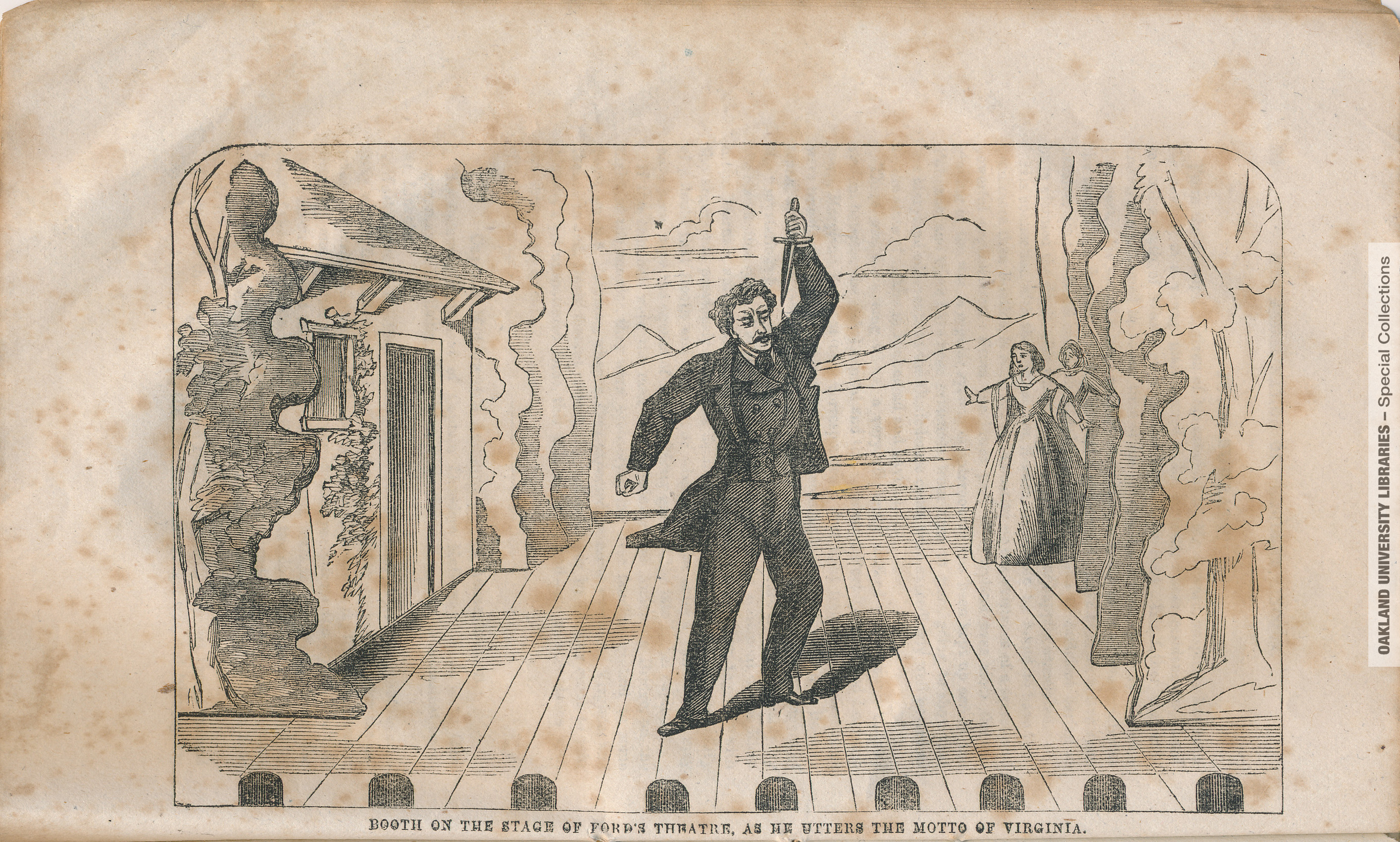
-
Description
Booth on the Stage of Ford's Theatre as He Utters the Motto of Virginia. Illustration from an early account of Lincoln's death, "The Terrible Tragedy at Washington: Assassination of President Lincoln."
-
Source
Springer Collection, Oakland University Special Collections
-
Rights
This item may be reproduced and used for any purpose, including research, teaching, private study, publication, broadcast, or commercial use, with proper citation and attribution.
-
Creator
anonymous
-
Publisher
Barclay and Co.
-
Date
May 1, 1865
-
Material
paper
from May. 1, 1865
The Terrible Tragedy at Washington
-
Full Title
The Terrible Tragedy at Washington: Assassination of President Lincoln
-
Description
Cover of an early account of the assassination of President Lincoln. The quotation beneath Lincoln's portrait is: "But if this country cannot be saved without giving up that principle, I was about to say that I'd rather be assassinated upon this spot than to surrender it?" - Abraham Lincoln"
-
Source
Springer Collection, Oakland University Special Collections
-
Rights
This item may be reproduced and used for any purpose, including research, teaching, private study, publication, broadcast, or commercial use, with proper citation and attribution.
-
Tags
-
Cite this Item
Barclay and Co.. "The Terrible Tragedy at Washington: Assassination of President Lincoln". Barclay and Co.. Remembering Lincoln. Web. Accessed June 23, 2025. https://rememberinglincoln.fords.org/node/801
from May. 1, 1865
The Terrible Tragedy at Washington: Assassination of President Lincoln
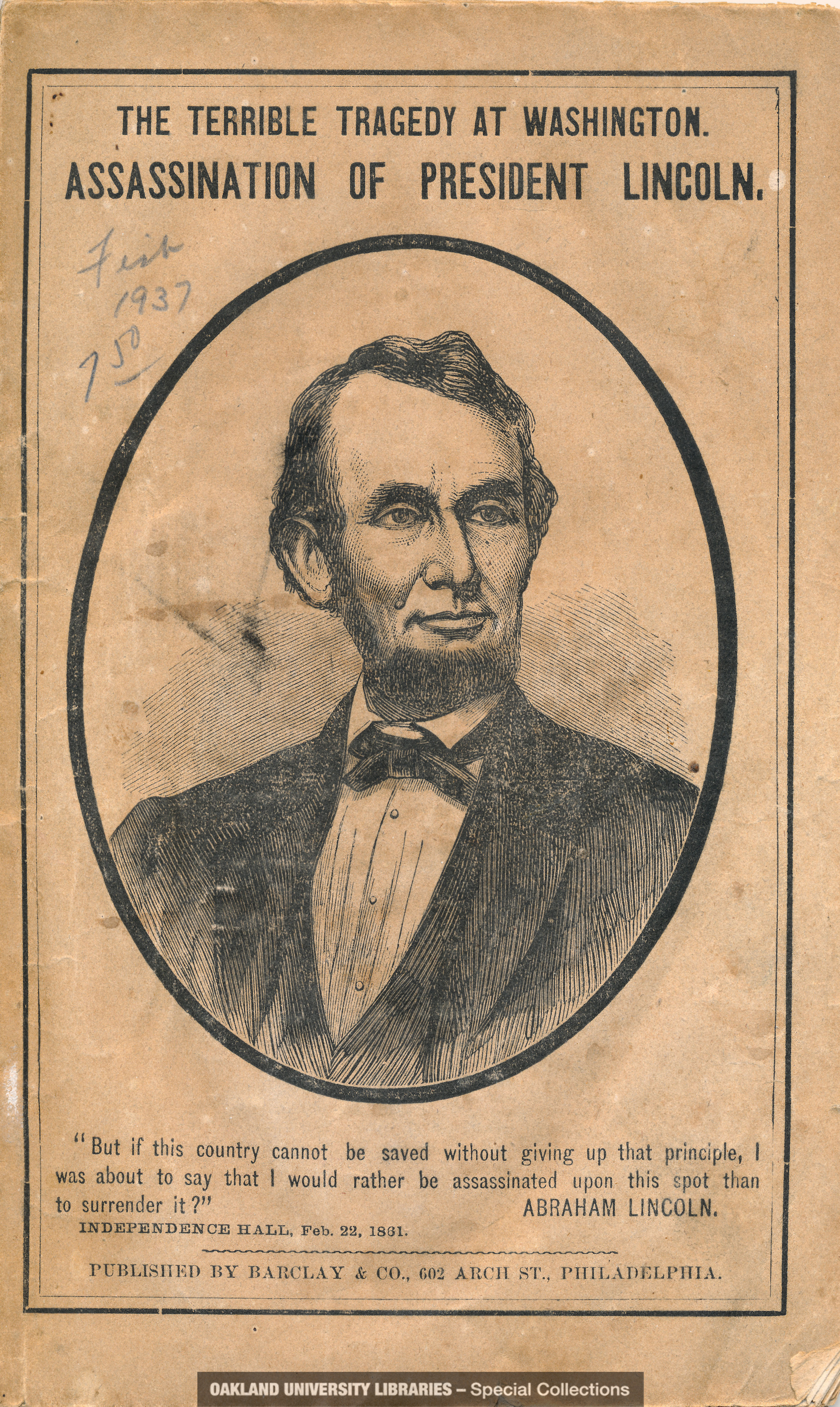
-
Description
Cover of an early account of the assassination of President Lincoln. The quotation beneath Lincoln's portrait is: "But if this country cannot be saved without giving up that principle, I was about to say that I'd rather be assassinated upon this spot than to surrender it?" - Abraham Lincoln"
-
Source
Springer Collection, Oakland University Special Collections
-
Rights
This item may be reproduced and used for any purpose, including research, teaching, private study, publication, broadcast, or commercial use, with proper citation and attribution.
-
Creator
Barclay and Co.
-
Publisher
Barclay and Co.
-
Date
May 1, 1865
-
Material
paper
from May. 1, 1865
Booth Killing Lincoln
-
Full Title
John Wilkes Booth Killing President Lincoln
-
Description
Assassination of President Lincoln in his private box at Ford's Theater, Washington, April 14, 1865. The named characters are: Booth, Mr. Lincoln, Mrs. Lincoln, Miss Harris and Major Rathbun. Illustration from an early account of Lincoln's death, "The Terrible Tragedy at Washington: Assassination of President Lincoln."
-
Source
Springer Collection, Oakland University Special Collections
-
Rights
This item may be reproduced and used for any purpose, including research, teaching, private study, publication, broadcast, or commercial use, with proper citation and attribution.
-
Tags
-
Cite this Item
anonymous. "John Wilkes Booth Killing President Lincoln". Barclay and Co.. Remembering Lincoln. Web. Accessed June 23, 2025. https://rememberinglincoln.fords.org/node/799
from May. 1, 1865
John Wilkes Booth Killing President Lincoln
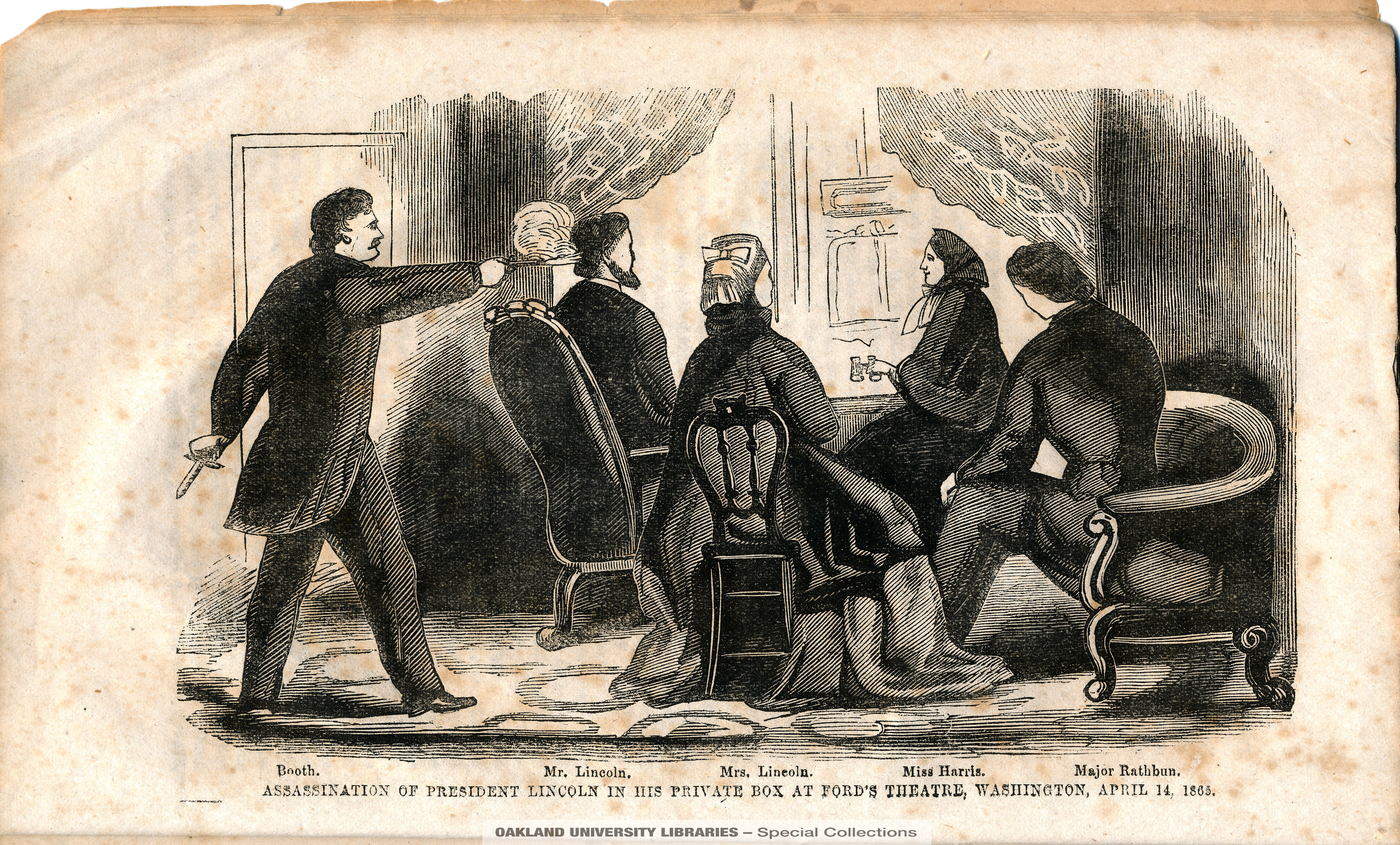
-
Description
Assassination of President Lincoln in his private box at Ford's Theater, Washington, April 14, 1865. The named characters are: Booth, Mr. Lincoln, Mrs. Lincoln, Miss Harris and Major Rathbun. Illustration from an early account of Lincoln's death, "The Terrible Tragedy at Washington: Assassination of President Lincoln."
-
Source
Springer Collection, Oakland University Special Collections
-
Rights
This item may be reproduced and used for any purpose, including research, teaching, private study, publication, broadcast, or commercial use, with proper citation and attribution.
-
Creator
anonymous
-
Publisher
Barclay and Co.
-
Date
May 1, 1865
-
Material
paper




